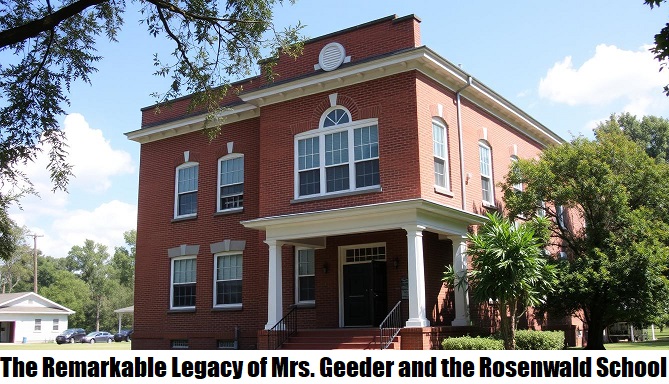
The history of Mrs. Geeder and the Rosenwald School is a profound narrative woven into the rich tapestry of American educational reform. The Rosenwald Schools, initiated in the early 20th century, provided invaluable educational opportunities for African American children during an era when racial segregation significantly limited their access to quality schooling. Mrs. Geeder’s involvement with the Rosenwald School movement marks her as a pivotal figure in this transformative period. In this article, we will explore the incredible contributions of Mrs. Geeder, her association with the Rosenwald School, and the broader impact of these institutions on American society.
The Rosenwald School Movement: A Historical Overview
The Rosenwald School movement was a collaboration between Julius Rosenwald, a philanthropist and then-president of Sears, Roebuck & Company, and Booker T. Washington, the renowned African American educator and founder of the Tuskegee Institute. Beginning in 1912, the duo launched an initiative to build schools for African American children in rural areas across the Southern United States. By 1932, more than 5,300 Rosenwald Schools were constructed, transforming the landscape of education for African Americans.
These schools were not just buildings; they symbolized hope and progress. At a time when public funding for African American education was severely lacking, the Rosenwald Schools stood as beacons of opportunity. The schools were known for their innovative architecture, designed to maximize natural light and create an environment conducive to learning, even in rural settings where resources were scarce.
Mrs. Geeder: A Champion of Education
Among the many figures who contributed to the success of the Rosenwald Schools, Mrs. Geeder stands out for her relentless dedication to improving educational outcomes for African American children. While information about her life is not as widely documented as some other key figures in the movement, her involvement with a local Rosenwald School highlights her commitment to community-building and education.
Mrs. Geeder’s advocacy for education went beyond mere involvement. She was instrumental in fundraising efforts, community organization, and ensuring the school adhered to the strict standards of the Rosenwald Fund, which required local communities to raise matching funds. This collaborative effort between the Rosenwald Fund and local communities ensured that the schools were not just externally funded but supported by the very people they were built to serve.
The Role of Rosenwald Schools in African American Education
The impact of the Rosenwald Schools on African American education cannot be overstated. During the era of Jim Crow laws and severe racial segregation, African American students were often relegated to dilapidated, underfunded schools with minimal resources. The Rosenwald Schools were a revolutionary solution to this systemic inequity.
By providing access to well-constructed school buildings, competent teachers, and standardized curricula, the Rosenwald Schools offered African American children a chance at a quality education that was previously denied to them. This educational reform helped create a generation of educated African Americans who would go on to become teachers, leaders, and activists.
Architecture and Design: Maximizing Learning Potential
One of the defining features of Rosenwald Schools was their thoughtful design. The architecture was purposefully crafted to enhance the learning environment. The buildings were often simple but elegant, with large windows to allow in natural light. This design choice was significant because many rural African American communities lacked electricity, and natural light was essential for creating a conducive learning environment.
In addition to natural lighting, the schools were typically built with standardized floor plans that allowed for the efficient use of space. This architectural innovation reflected a broader emphasis on creating a quality educational experience despite limited resources.
Mrs. Geeder’s Lasting Influence
Mrs. Geeder’s work with the Rosenwald School movement left a lasting legacy in her community. As a local leader and advocate for education, she was pivotal in ensuring that the school in her area was not only built but maintained to the highest standards. Her influence extended beyond the physical construction of the school; she helped foster a community culture that valued education, even in the face of overwhelming obstacles.
Through her efforts, Mrs. Geeder became a role model for future generations, showing that change was possible through collective effort and perseverance. Her work in securing better educational opportunities for African American children in her community helped pave the way for the civil rights movement, which would begin to take shape in the decades following the establishment of the Rosenwald Schools.
The Broader Impact of Rosenwald Schools
The success of the Rosenwald Schools was not limited to individual communities; it had far-reaching effects on the broader African American population in the South. By 1932, one in every five rural schools for African Americans in the South was a Rosenwald School. These institutions educated thousands of children who would go on to become integral members of their communities and the larger civil rights movement.
Many of the students educated in Rosenwald Schools became the teachers, ministers, doctors, and leaders who would challenge the deeply entrenched segregationist policies of the mid-20th century. The schools produced a generation of educated African Americans who were ready to demand equality and justice in all areas of life.
Rosenwald Schools as a Catalyst for Change
While the Rosenwald Schools were primarily focused on providing education, they also became centers of community activity and activism. These schools were often the only public buildings available to African American communities, serving as gathering places for meetings, discussions, and social events. In this way, Rosenwald Schools played a crucial role in the development of a strong African American community identity in rural areas.
Many historians credit the Rosenwald Schools with helping to lay the groundwork for the civil rights movement. By providing African American children with an education, these schools helped instill a sense of pride and possibility that would later fuel demands for social and political change.
The Enduring Legacy of Mrs. Geeder and the Rosenwald School Movement
Although the era of the Rosenwald Schools has passed, their impact continues to resonate. The schools are a testament to the power of community-driven change and the importance of access to quality education for all. Mrs. Geeder’s role in this movement serves as a reminder that individual efforts, when combined with community support, can create lasting change.
In recognizing the legacy of Mrs. Geeder and the Rosenwald Schools, we honor not only the individuals who made these schools possible but also the countless students whose lives were transformed by the opportunities they provided. The story of Mrs. Geeder and the Rosenwald Schools is a story of perseverance, hope, and the transformative power of education.
Conclusion
The story of Mrs. Geeder and the Rosenwald Schools represents a pivotal chapter in the history of American education. In a time when racial segregation severely restricted opportunities for African Americans, these schools provided not only a place to learn but also a beacon of hope for entire communities. Mrs. Geeder’s dedication to ensuring the success of her local Rosenwald School exemplifies the power of grassroots efforts in bringing about real, lasting change.
Through the construction of more than 5,300 schools, the Rosenwald movement transformed the educational landscape for African Americans in the rural South. These schools were more than just buildings—they were centers of learning, community, and progress. Mrs. Geeder’s contributions, though perhaps lesser known in the broader historical record, played an essential role in fostering an environment where education could thrive against the odds.

